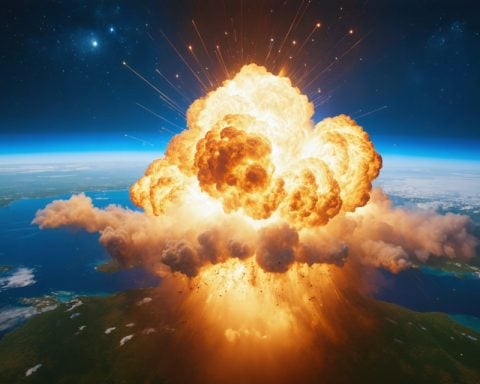In the early 1980s, global tensions were at a peak, with the prospect of nuclear warfare hanging over the world like a dark cloud. Fast forward to today, and a similar atmosphere of anxiety persists as the relationship between Russia and NATO has deteriorated.
During a recent address to the United Nations Security Council, Russian President Vladimir Putin expressed stern warnings against any aggression towards Russia, suggesting that such an act could trigger a severe response. He emphasized that any attack supported by a nuclear-armed state would be interpreted as a unified assault on Russia, leading to potential nuclear countermeasures.
Putin’s statements come amid Ukraine’s pleas for advanced long-range weapons that would enable strikes into Russian territory, complicating the already fragile security landscape in Europe. This new rhetoric marks a significant shift, instilling trepidation reminiscent of the Cold War era.
Reflecting on the history of near-miss nuclear crises, one pivotal moment stands out: the actions of Lt. Col. Stanislav Petrov. On September 26, 1983, Petrov was on duty monitoring the Oko early-warning system when he received alarming reports of a missile launch. Instead of reacting hastily, he suspected a malfunction, ultimately preventing an unnecessary nuclear response that could have led to catastrophic consequences.
His cautious judgment in a time of crisis serves as a stark reminder of the fine line between diplomacy and destruction.
Essential Tips and Life Hacks for Navigating Times of Uncertainty
In a world where global tensions occasionally echo the fears of past decades, it’s crucial to find ways to stay informed and calm amidst the storm. Here are some tips, life hacks, and interesting facts that can help you manage stress and enhance your understanding of international relationships.
Stay Informed, but Balance Your Consumption
In times of international unrest, it’s easy to become overwhelmed by the news. Designate specific times to check updates and avoid continuous scrolling. This can help manage anxiety levels while keeping you informed about critical developments.
Create a Personal Action Plan
Having a plan for emergencies can be empowering. Outline key steps to take in various scenarios, such as natural disasters or political unrest. Ensure your family is on the same page to maintain calm and assurance.
Practice Mindfulness and Stress Relief
Engaging in mindfulness techniques such as meditation or yoga can significantly reduce stress. Even a few minutes of deep breathing can refocus your thoughts and help you approach challenging situations more effectively.
Learn from History
Understanding historical events, like the incident involving Lt. Col. Stanislav Petrov, can provide perspective. Recognize that critical decisions often dictate the course of history and that careful deliberation can prevent calamities. Knowledge can also empower you to rationally evaluate current situations.
Engage in Community Discussions
Talking to others about your concerns can be a breath of fresh air. Join local or online discussion groups focused on international relations; sharing knowledge and differing perspectives can help dispel fear and develop a more balanced viewpoint.
Keep a Long-Term Perspective
Global dynamics are constantly changing. Though current tensions may seem dire, history shows that resolutions are possible. Regularly remind yourself of moments of peace and cooperation among nations, reinforcing optimism in the face of adversity.
Explore Positive Innovations
New technologies and diplomatic initiatives frequently emerge from times of conflict. Stay updated on innovations that aim to enhance global security, peace talks, or improve humanitarian efforts. This knowledge can foster hope and show that progress is possible even in difficult times.
Interesting Fact: The Power of Peace Initiatives
Historically, many global treaties and peace initiatives have arisen from crises. The aftermath of World War II led to the establishment of NATO, aimed at fostering stability and cooperation among nations. Understanding these historical contexts highlights the potential for constructive outcomes even amidst tension.
To learn more about international relations and their dynamics, visit c-span.org for informative discussions and insights.



















